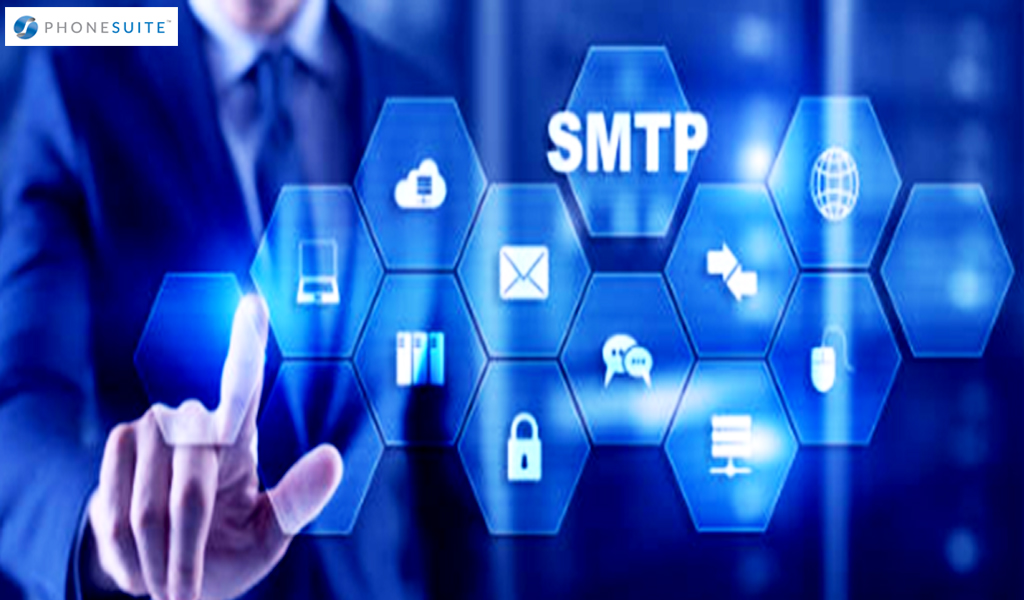
What is SMTP or SMTP, or Simple Mail Transfer Protocol?
SMTP stands for “Simple Mail Transfer Protocol.” It is a standardized protocol used for sending and receiving email messages on the internet. SMTP is responsible for the transmission of outgoing emails from a sender’s email client or server to the recipient’s email server. Here’s how it works:
Sender’s Server or Client:
- When a person sends an email using an email client (such as Outlook, Thunderbird, or a smartphone email app) or from an email server (like Gmail or Microsoft Exchange), the email is prepared for sending.
SMTP Server:
- The sender’s email client or server connects to an SMTP server, which is responsible for routing and delivering the email. SMTP servers are typically provided by internet service providers (ISPs), email hosting services, or companies with their email infrastructure.
Recipient’s SMTP Server:
- The sender’s SMTP server communicates with the recipient’s SMTP server. It does this by looking up the recipient’s email domain (e.g., example.com) to find the appropriate recipient server’s address using DNS (Domain Name System).
Delivery:
- The recipient’s SMTP server accepts the incoming email and places it in the recipient’s mailbox or forwards it to another server if the recipient is hosted elsewhere.
SMTP operates on port 25 for unencrypted communication and port 587 for secure, encrypted communication (TLS/SSL). It uses a set of commands and responses to communicate between servers and ensure the proper delivery of email messages.
SMTP is a foundational protocol of email communication, and it primarily handles the routing and delivery of email messages. It doesn’t concern itself with reading or storing emails; its primary job is to transfer messages reliably from the sender to the recipient’s server.
It’s essential to note that SMTP is part of the broader email ecosystem, which includes other protocols like IMAP (Internet Message Access Protocol) and POP3 (Post Office Protocol version 3) for email retrieval and MIME (Multipurpose Internet Mail Extensions) for encoding multimedia content in emails. These protocols work together to enable the complete email experience.
Advantages of Using SMTP in Hotel Businesses:
Using SMTP (Simple Mail Transfer Protocol) in hotel businesses offers several advantages that facilitate communication with guests and streamline various operational processes. Here are some of the key advantages:
Efficient Communication:
- SMTP enables hotels to efficiently communicate with guests via email. This includes sending reservation confirmations, pre-arrival information, post-stay surveys, and promotional emails.
Automated Messaging:
- SMTP can be integrated with hotel management systems (PMS) and booking platforms to automate the sending of reservation confirmations and other important messages, reducing the need for manual intervention.
Timely Notifications:
- SMTP ensures that guests receive timely notifications and updates, such as check-in/check-out instructions, room change notifications, and billing information, which can enhance the overall guest experience.
Feedback Collection:
- SMTP is instrumental in collecting guest feedback through post-stay surveys or reviews. This feedback is valuable for making improvements and enhancing guest satisfaction.
Cost-Effective:
- Email communication through SMTP is generally cost-effective compared to traditional postal mail or phone calls. It reduces paper and postage costs while reaching a wider audience.
Record-Keeping:
- SMTP facilitates the creation of digital records of all email communications, making it easier for hotels to keep track of guest interactions, reservations, and other essential information.
Global Reach:
- SMTP allows hotels to communicate with guests worldwide, making it suitable for international guests and travelers.
Data Analytics:
- SMTP-generated email data can be analyzed to gain insights into guest preferences, behavior, and engagement. This information can inform marketing strategies and service improvements.
Security:
- SMTP supports secure email communication through encryption protocols like TLS/SSL, ensuring the confidentiality and integrity of sensitive guest information, such as payment details and personal data.
Emergency Notifications:
- In case of emergencies or unforeseen circumstances, hotels can quickly notify guests via email through SMTP, providing guidance and ensuring their safety.
Multi-Language Support:
- Hotels can send emails in different languages, catering to the diverse international clientele often found in the hospitality industry.
Reduced Administrative Work:
- By automating many guest communication processes, SMTP reduces the administrative burden on hotel staff, allowing them to focus on other critical tasks.
Flexibility:
- SMTP is highly flexible and can be tailored to meet the specific needs of different hotel types, from luxury resorts to budget accommodations.
Operational Efficiency:
- Streamlined email communication with guests can lead to better operational efficiency, as staff members spend less time on phone calls or manual email sends.
Guest Retention:
- Effective communication through SMTP can help resolve guest issues promptly, increasing the likelihood that guests will return and recommend the hotel to others.
In summary, SMTP plays a crucial role in enhancing guest communication, operational efficiency, and marketing efforts within the hospitality industry. Leveraging the advantages of SMTP can contribute to improved guest satisfaction, increased revenue, and a more competitive position in the market.
Other Use of SMTP, or Simple Mail Transfer Protocol
- SMTP is not only used for sending and receiving emails but also for verifying email addresses and preventing spam. SMTP servers use various techniques, such as greylisting and DNS-based Blackhole List (DNSBL) to prevent spam and protect against email forgery.
- Greylisting is a technique used by SMTP servers to prevent spam by temporarily rejecting emails from unknown senders. When an email is received from an unknown sender, the SMTP server sends a temporary rejection message to the sender’s server, requesting that the email be re-sent after a specified time period. Legitimate email servers will retry sending the email, while spam servers typically do not. This technique helps to reduce the amount of spam received by a hotel’s email servers.
- DNSBL is another technique used by SMTP servers to prevent spam. DNSBL is a database that lists IP addresses of known spam servers. SMTP servers can use DNSBL to reject emails from servers listed in the database. This technique helps to reduce the amount of spam received by a hotel’s email servers.
- SMTP is also used for email authentication, which helps to prevent email spoofing and phishing attacks. Email authentication involves verifying that the sender of an email is authorized to use the domain name in the email address. SMTP servers use various authentication methods, such as Sender Policy Framework (SPF) and DomainKeys Identified Mail (DKIM) to verify email authentication.
- SPF is a method that allows domain owners to specify which SMTP servers are authorized to send email on their behalf. When an email is received, the recipient’s SMTP server checks the SPF record of the sender’s domain to verify that the sending SMTP server is authorized to send email for that domain.
- DKIM is a method that uses digital signatures to authenticate the sender of an email. When an email is sent, the sending SMTP server adds a digital signature to the email header. The recipient’s SMTP server can then verify the signature to ensure that the email was sent by an authorized sender and has not been tampered with.
Another important aspect of SMTP is its support for email tracking and delivery notifications. SMTP allows hotels to track the delivery of their emails, providing insights into whether an email was successfully delivered, opened, and clicked. This information can be used to improve the effectiveness of email campaigns and ensure that important guest communications are received and acted upon.
SMTP also provides hotels with the ability to customize their email communication with guests. With SMTP, hotels can personalize emails based on guest preferences, booking history, and other relevant information. This allows hotels to provide a more personalized and engaging guest experience, leading to increased guest satisfaction and loyalty.
Moreover, SMTP can be integrated with other hotel management systems, such as Customer Relationship Management (CRM) and Property Management Systems (PMS), to provide a seamless communication workflow. For example, when a guest books a room online, the booking information can be automatically sent to the hotel’s PMS system, which can then send a confirmation email to the guest using SMTP. This not only saves time and reduces errors but also improves the guest experience by providing a quick and efficient booking process.
Finally, SMTP can be used to provide real-time alerts and notifications to hotel staff. For example, when a guest sends an email to the hotel’s customer service team, the email can be automatically forwarded to the relevant staff member’s email address using SMTP. This ensures that guest requests are responded to quickly and efficiently, leading to increased guest satisfaction.
Conclusion
SMTP is a powerful technology that provides a reliable, secure, and scalable way to send and receive emails. It is essential for the hospitality industry, where communication is key to providing excellent customer service. By using techniques such as greylisting, DNSBL, and email authentication, SMTP helps to prevent spam and protect against email forgery. With its numerous advantages, SMTP is an indispensable tool for any hotel business that wants to stay ahead of the competition and provide the best possible guest experience.
Contact Us Today!
Phonesuite Voiceware provides an easy-to-use and reliable system to help bring your hotel communication into the 21st century. With our industry experience, advanced technologies and remote service, we have everything you need to reduce costs and ensure that your network remains up-to-date. The performance of our system also enables business owners to devote more time and energy into increasing growth. Ultimately, a well-designed communication system is integral for any successful business and PhoneSuite is committed to providing the perfect solution for all your needs. If you are looking for a comprehensive hotel communication solution or would like advice and guidance on how best to update your current system, please don’t hesitate to contact us today!




